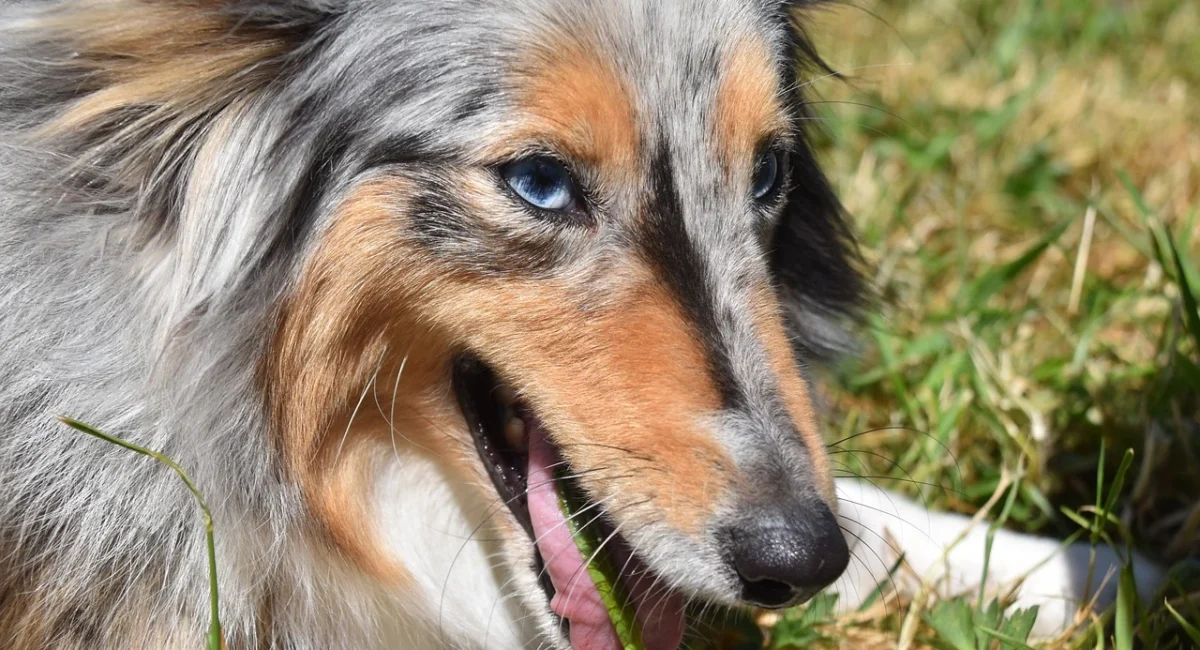There are several hypotheses as to why dogs eat grass, and it is very typical behavior. It’s significant to highlight that there isn’t a single conclusive explanation because each dog may have different motivations. Listed below are a few potential explanations for your dog eating grass:
Digestive Unrest in dogs :
One of the most frequently mentioned explanations is that dogs may eat grass when they are experiencing digestive unrest. The grass may aid dog vomiting grass, which can help them get rid of food that isn’t agreeable to them or relieve gastrointestinal pain.
Nutritional Deficiency in dogs:
Some specialists think that if dogs have specific nutritional inadequacies, they may consume grass. Fibre and other elements that lack in their regular diet can be found in grass. This notion is less substantiated, though, because dogs that eat premium commercial dog food often have balanced diets.
Dogs have a natural instinct to hunt and eat meat. But their predecessors may have occasionally ingested plant material in the wild. It’s possible that eating grass is a natural instinct that comes from their wild ancestors.
Behavioural Habit in Dog Eating Grass:
Because they like the flavour or feel of grass, some dogs may make it a habit to eat it. If they’ve received good results from it in the past, they might keep doing it.
Dogs may eat grass because of boredom or nervousness, according to reason number five. They may act strangely, such as munching grass to pass the time or soothe themselves. If they are not given adequate mental or physical stimulation.
It’s Unpredictable of Why Dogs Are Eating Grass:
Dogs occasionally consume grass for no apparent reason. Dogs are individuals, and they might exhibit different behaviors from one another. This behavior might not always have a clear cause.
Dogs can normally consume modest amounts of grass without danger, but you should keep an eye on your dog’s behaviour. Consult your veterinarian if your dog is eating a lot of grass. If your dog appears to be having any negative effects, such vomiting, diarrhoea, or discomfort also consult your veterinarian. They can evaluate the general health of your dog. Also they can deal with any underlying problems that might be causing this behaviour. In addition, your veterinarian can also assist in identifying the problem. Further they will provide appropriate treatment if you think your dog is eating grass because of a digestive problem.
How to stop dogs from eating grass
To stop your dog from eating grass, follow these steps:
- To address your dog’s grass-eating behavior, follow these steps:
- Ensure a balanced diet: Choose high-quality commercial dog food that meets your dog’s nutritional needs and reduces their desire to eat grass.
- Supervise and redirect your dog’s behavior: Use positive reinforcement techniques to redirect their attention away from eating grass.
- Increase physical exercise and mental stimulation: A tired and mentally stimulated dog is less likely to engage in random behaviors like eating grass out of boredom.
- Offer safe alternatives: Provide safe chew toys or treats to satisfy their need to chew.
- Train the “Leave It” command: Start with treats and gradually apply it to other situations.
- Check for health issues: If your dog’s behavior is excessive or accompanied by signs of distress, consult your veterinarian.
- Modify the environment: Use barriers, fencing, or landscaping changes to discourage access to the grass.
- Consult a professional dog trainer or behaviorist: If your dog’s grass-eating behavior persists or causes health concerns, consult a professional for personalized guidance and training techniques.
It’s important to keep in mind that dogs frequently engage in dog eating grass moderation, which is generally not detrimental to them. However, it’s crucial to take immediate action with the help of your veterinarian and, if necessary, a dog behavior specialist if your dog’s grass consumption becomes excessive, if they eat grass treated with pesticides or chemicals, or if it results in health problems.
Why do dogs eat grass and then throw out
Dog eating grass and then vomiting is a behavior that some dogs exhibit, and there are a few possible explanations for this:
Dogs may instinctively eat grass when they have an upset stomach. It can help induce vomiting and relieve gastrointestinal discomfort. In the wild, canines occasionally consume plant matter as part of their diet, and this behavior might be a remnant of this instinct. Dog eating grass may also serve as a way to cleanse their digestive system or add roughage to their diet. Dogs may eat grass out of boredom or anxiety, and if they are not mentally or physically stimulated enough, they may engage in unusual behaviors like eating grass to pass the time or self-soothe.
Conclusion
While this behaviour may trigger sickness, it’s crucial to remember that it generally isn’t a cause for concern unless it happens frequently or is accompanied by other unsettling symptoms. The occasional eating of grass followed by vomiting is typically regarded as natural. However, it’s a good idea to visit your veterinarian if your dog is constantly throwing up, seems ill, or displays other symptoms of disease (such as lethargy, diarrhoea, loss of appetite, or changes in behaviour).
As was indicated in the previous comment, if you’re worried about your dog’s grass-eating behaviour, you can take measures to reduce it. It is possible to lessen the likelihood of excessive grass eating by offering a balanced diet, lots of physical activity, and mental stimulation, as well as teaching instructions like “leave it”. However, it’s critical to address any underlying health issues with the help of a veterinarian if your dog continues to eat grass to the point of vomiting.
- Read more about Pet Supplements in Australia
- Read more about Dog Supplements for Joints
- Read more about Pregnant Dog: How To Take Care Of Your New Furry Friends
- Read more about Ringworm in Dogs
- Read more about Can Dogs Eat Raw Meat?

